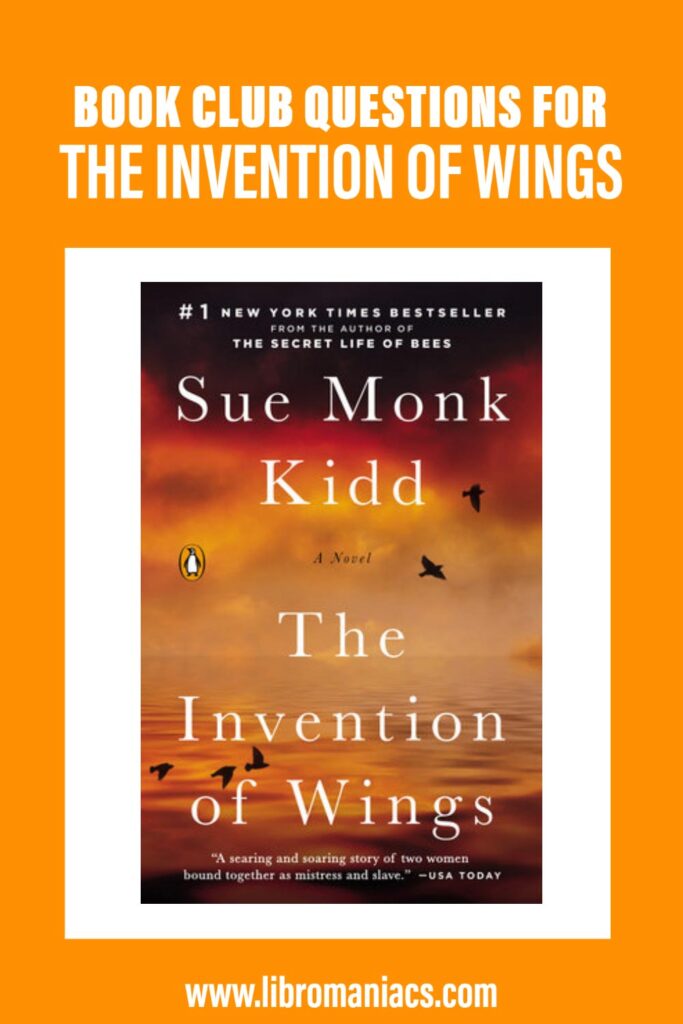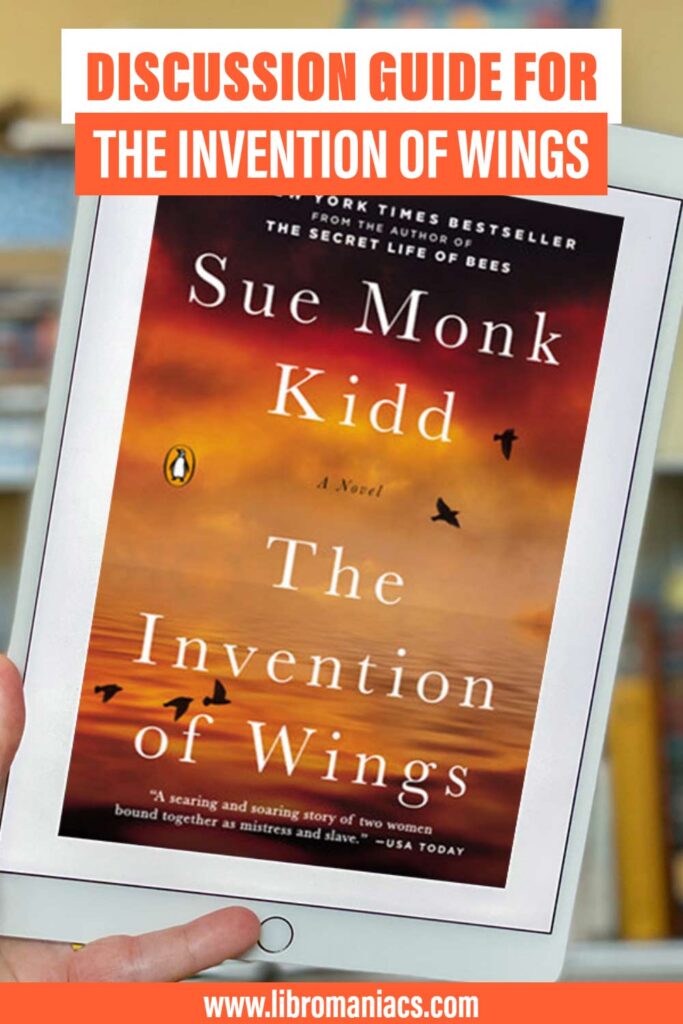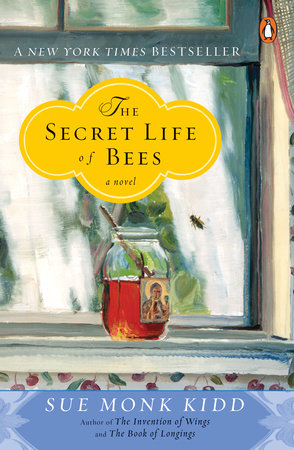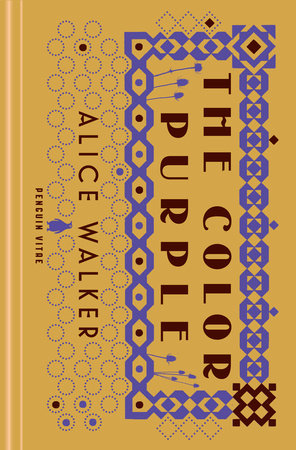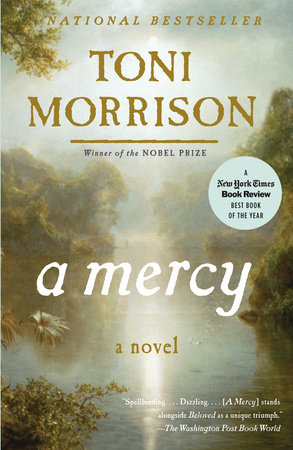If you’ve set a goal to help your book club read more diversely or examine racial issues, we have just the book for you: The Invention of Wings, by Sue Monk Kidd. Selected by Oprah’s Book Club 2.0 and based on the true story of one of America’s first female abolitionists, The Invention of Wings is filled with the sights, smells, crafts, and chores of a bygone era. But be warned, once you are transported into the past, you will have to reckon with some of its most troubling questions.
What allows people to overlook atrocities committed right under their noses? Can true love co-exist with pity, anger, and guilt? Is freedom worth paying any price? We’re here to help you tackle these thorny themes with our The Invention of Wings book club questions.
Our discussion guide for The Invention of Wings is formatted to help you make the most of the lessons you internalized while you were reading. First, we’ve provided a synopsis of the book, to help you keep track of all those characters and historical events. Next, we’ve provided 10 The Invention of Wings book club questions that should spark conversation between you and your friends. Finally, we’ve curated a few quotes from book reviews to ensure you and your book club get to see the full breadth of opinions on this read!
And if you enjoyed the novel, be sure to read to the end of this guide for a special treat. We’ve provided suggestions for 3 books like The Invention of Wings!
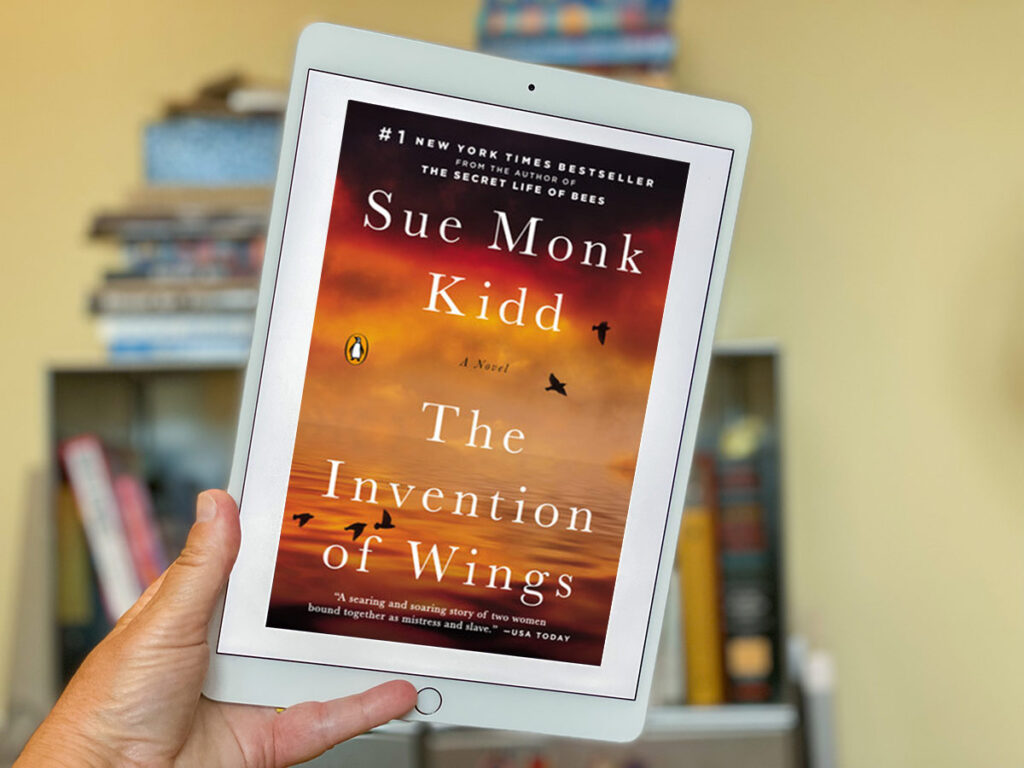
(This article contains affiliate links. This means that if you choose to purchase, I’ll make a small commission.)
The Invention of Wings Synopsis
The Invention of Wings, Sue Monk Kidd
Hetty “Handful” Grimke, an urban slave in early nineteenth century Charleston, yearns for life beyond the suffocating walls that enclose her within the wealthy Grimke household. The Grimke’s daughter, Sarah, has known from an early age she is meant to do something large in the world, but she is hemmed in by the limits imposed on women.
Kidd’s sweeping novel is set in motion on Sarah’s eleventh birthday, when she is given ownership of ten year old Handful, who is to be her handmaid. We follow their remarkable journeys over the next thirty five years, as both strive for a life of their own, dramatically shaping each other’s destinies and forming a complex relationship marked by guilt, defiance, estrangement and the uneasy ways of love.
As the stories build to a riveting climax, Handful will endure loss and sorrow, finding courage and a sense of self in the process. Sarah will experience crushed hopes, betrayal, unrequited love, and ostracism before leaving Charleston to find her place alongside her fearless younger sister, Angelina, as one of the early pioneers in the abolition and women’s rights movements.
Inspired by the historical figure of Sarah Grimke, Kidd goes beyond the record to flesh out the rich interior lives of all of her characters, both real and invented, including Handful’s cunning mother, Charlotte, who courts danger in her search for something better.
This exquisitely written novel is a triumph of storytelling that looks with unswerving eyes at a devastating wound in American history, through women whose struggles for liberation, empowerment, and expression will leave no reader unmoved.
10 The Invention of Wings Book Club Questions
- Sarah observes that “Everyone said I was Father’s favorite. I don’t know whether he preferred me or pitied me.” Later, Handful echoes this sentiment by noting, “[Sarah] loved me and pitied me. I loved her and used her. It never was a simple thing.”
What do you think is the relationship between love and pity? Can pity be a form of true love?
- Both Sarah and Handful use objects to store their deepest hopes, Sarah with her silver button and Handful with her spirit tree. What do you think drives the characters to create these symbolic objects? Why do the objects take on such importance in the character’s lives?
- When Handful is distressed by reading a list of the dollar value of each of the Grimke’s slaves, Charlotte comforts her by saying, “Ain’t nobody can write down in a book what you worth.”
Do you think it’s possible to measure a person’s worth? Do certain skills or character traits make some people more valuable to the world than others, or does everyone have the same intrinsic worth?
- Thomas argues in favor of an idea called “colonization,” in which the abolition of slavery is followed by deporting freed slaves back to Africa. Why do you think Thomas believes this is a good idea? What do you think of the idea?
- Handful speculates that Denmark might have been exaggerating the number of slaves who would join his rebellion and the number of weapons they had access to. Do you think it was immoral for Denmark to make these exaggerated claims, or was he justified by his desire to encourage and inspire others?
- Of the main characters’ love interests–Israel, Theodore, Denmark, and Goodis–which character was your favorite? Which character disappointed you the most?
- Sarah and Nina both “desert” to the north in order to work towards the reforms they want to see in the south.
Do you agree that it was necessary for them to go north in order to be able to make the changes they wanted to see in the south? What might have happened if they had remained in Charleston?
- Some of the male leaders of the abolitionist movement attempt to persuade Sarah and Nina to postpone their pursuit of equality for women, claiming that this pursuit distracts from the more urgent need to free slaves.
What do you think of this argument? If you were Sarah or Nina, do you think you could’ve been persuaded? Can you think of some examples in more modern movements (such as the suffregettes, first wave feminism or the civil right movements), where there have also been competing priorities?
- Sky likes to sing a song with the lyrics, “If you don’t know where you’re going, you should know where you come from.” Why do you think these lyrics mean so much to Sky? What do they mean to you?
- Mary tries to defend the institution of slavery by saying, “It’s our way of life.” Many other characters admit that they dislike slavery, but they accept it because the institution is so deeply engrained in their “way of life.”
Can you think of any unethical institutions you’re currently accepting because they’re part of your “way of life?” What could you do to try to change those institutions?
Selected Reviews for The Invention of Wings
Take a look at these reviews and see if any of the reviewers mirrored your own experience with the book. Do you agree with them? Do you disagree?
“We think that we know something about the atrocities of slavery because we learned about it in American history class, or we saw glimpses of it in a movie or a book. But it isn’t until we confront a depiction of it that seems so real and horrible, that we realize how very little we really know of the injustice of slavery.”
“Basically it is a fairly run of the mill story about two girls of a similar age in the nineteenth century who grow up in different social settings – one a slave and one her owner. Yes the story is interesting and the contrasts it paints between the different social strata of society in nineteenth century Charleston is well done. However I didn’t think it was any better written than any other novel of this type.”
“This reads as a stereotypical novel that illustrates the cruel capability of mankind, but ultimately leaves you wanting more from the rushed and poorly developed segments that gave you a glimmer of hope regarding humanity.”
“Slavery is bad. Of course, but there is no discussion of why so many people refused to abandon it. Nothing of the economic basis for slavery in the South is discussed. Am I too much of a non-fiction book lover for this? Should I give up on historical fiction completely?”
3 Books Like The Invention of Wings
We’ve also got a book club guide for The Revisioners, which includes the historical backstory of a woman holding down her farm in the post-reconstruction era South. And another for Horse, which explores slavery’s legacy through the lens of horse racing. Our book club guide for Let Us Descend explores slavery and a magical realism journey. And the guide for James, explores an alternative look at Huck Finn.
And the modern day family drama An American Marriage, about a marriage torn apart when the husband is falsely convicted of a crime in Atlanta. And if you are keen on more history fiction on the hidden lives of women, check out The Lost Apothecary.
The Secret Life of Bees, Sue Monk Kidd
If you can’t get enough of Sue Monk Kidd’s lyrical writing style and soul-searching characters, The Secret Life of Bees belongs at the top of your reading list. The Secret Life of Bees explores themes of racial inequality through the eyes of Lily, a young, motherless white girl, surrounded by Black women who are almost mystical in their talents: beekeeping, cello playing, and storytelling.
Together, these women teach Lily how to be her own mother, how to love others without fear, and how to stand up against social injustice wherever she sees it.
The Color Purple, Alice Walker
The Invention of Wings, along with many other novels that attempt to address racial issues, has been criticized for butting up against the limitations of a white author attempting to write from a person of color’s perspective. If you are one of those who feels that minority stories are best told by minority voices, then Alice Walker’s classic novel The Color Purple will speak to you.
The Color Purple tells the story of Celie, a black woman who is oppressed both by the white community and by the men in her life. Like Charlotte in The Invention of Wings, Celie finds a way to express herself through sewing, and this act of self-expression drives her to fight for independence in other areas of her life. The Color Purple wrestles with issues of racial and gender inequality and explores the complexities of romantic connections that have ulterior motives.
A Mercy, Toni Morrison
Another novel about minority characters told by a minority voice, Toni Morrison’s A Mercy runs thick with history and emotion. While many books about racial issues are set after the abolition of slavery, A Mercy actually predates the abolition movement described in The Invention of Wings by at least a hundred years.
The characters of A Mercy move throughout early colonial America, encountering various religions and attitudes towards women, native people, and the institution of slavery. Each character struggles with a sense of displacement and isolation, and like Sarah in The Invention of Wings, longs to find the place where she belongs.
Have a listen on Audible. Try audio books for free for 30 days.
Share this discussion guide for The Invention of Wings with your friends:
